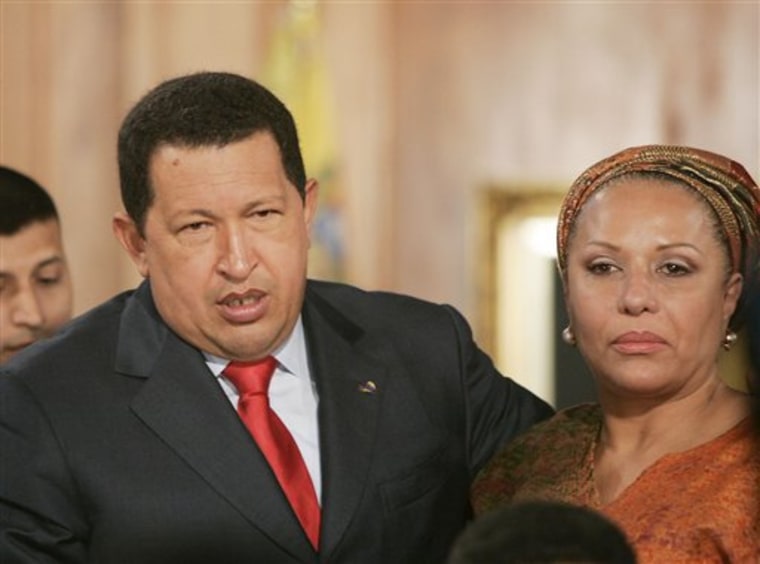If Colombia's leftist rebels safely deliver three hostages to Venezuelan President Hugo Chavez, the goodwill gesture will likely increase pressure for major government concessions to secure the release of 44 other high-profile captives.
The government has so far been unable to engage the rebels in talks aimed at the release of the hostages, including three American defense contractors, in exchange for hundreds of imprisoned rebels.
As relatives and international observers gathered in Caracas on Thursday, Chavez was preparing to send Venezuelan helicopters into Colombia's lawless jungles to retrieve the initial three hostages from a rebel hideaway.
The liberation of former congresswoman Consuelo Gonzalez, Clara Rojas and her 3-year old son Emmanuel — a child allegedly fathered by a rebel captor — is expected to take place in an unspecified Colombian location as early as Friday.
It's the latest move in a violent chess game between the rebels and Colombia's U.S.-aligned government, which have been at war for five decades. A larger swap of hostages for rebel prisoners would be a much bigger move toward peace.
The Revolutionary Armed Forces of Colombia, or FARC, announced it would unilaterally release the first three hostages as a goodwill gesture.
But it serves other purposes. Politically, the move has isolated the FARC's avowed enemy, Colombian President Alvaro Uribe.
Testing the waters for more negotiations
Allowing the Venezuelans to cross battle lines and extract the hostages is risky for the rebels, since Colombia's military is sure to track the helicopters. But the handover also tests the waters for more direct negotiations, which haven't happened since Uribe took office in 2002.
With tremendous mistrust on both sides, they haven't been able to come to terms on a temporary demilitarized zone where unarmed rebels and government representatives might come together to discuss a larger prisoner swap.
For Chavez, the rebels' handpicked foil, it's an opportunity to revive a peacemaking role Uribe abruptly ended only weeks earlier after accusing the firebrand leftist of overstepping his mandate by contacting Colombia's army chief.
Chavez still hopes to mediate a broader swap of all the hostages for jailed rebels, one of his top ministers, diplomat Rodolfo Sanz, said Thursday. "This is the start of a peace process in Colombia," he said.
Chavez invited an international commission of observers from France, Argentina, Brazil, and other Latin American countries to monitor the delicate operation.
Uribe, vacationing at his ranch near the Caribbean coast, has been all but sidelined from the humanitarian mission. Publicly derided by Chavez as Washington's "lapdog," the conservative leader now faces the greater insult of seeing Venezuelan military aircraft on Colombian soil.
The helicopters will depart from Villavicencio, 50 miles south of the Colombian capital, and won't be told where to go until they are in the air.
It matters little that the aircraft will bear international Red Cross insignia.
Some observers of Colombia's conflict see Chavez' involvement as a rebuke to Uribe's hard-line approach that, despite more than $600 million in annual U.S. military aid, has failed to vanquish the rebels from the eastern third of the country they largely dominate.
"One of Uribe's strongest arguments is that you can't deal with the FARC because they never give an inch," said Adam Isacson, an analyst for the Washington-based Center for International Policy. "This is a clear example of them giving something unilaterally. It's a gambit the government will be hard-pressed to reciprocate."
Among those likely to push for flexibility is French President Nicholas Sarkozy, who has campaigned for the release of Ingrid Betancourt, a dual French-Colombian citizen who was kidnapped along with her aide Rojas while campaigning for president in 2002. Also pressing for talks are the families of three U.S. Pentagon contractors whose plane went down in rebel territory in 2003.
Washington has been more amenable to Uribe's threats to rescue the hostages militarily. But families of the hostages fear a bloodbath. Many past military encounters have ended with hostages being killed.
Captives chained by neck
The guerrillas see themselves as modern day Robin Hoods, but the first glimpse of the hostages is likely to be a harrowing testament to the brutal conditions of their captivity.
The few captives who have escaped say hostages are frequently chained by the neck and kept in isolation, watched over by guards instructed to kill to prevent escapes. The jungle itself can be ruthless — American Marc Gonsalves is one of several hostages to have suffered from hepatitis.
Betancourt appeared thin and depressed in videos and a letter to her mother seized last month by Colombian authorities.
"I am not well physically," she wrote. "My appetite is frozen, my hair is falling out in large quantities."
